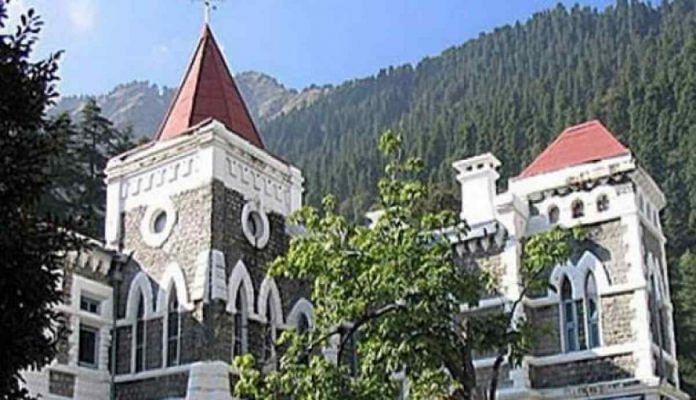The move by lawyer Chhitij Sharma, perhaps the first of its kind, comes after Uttarakhand HC dismissed a contempt case against the judge.
New Delhi: A Nainital-based lawyer is set to move the Supreme Court to challenge an Uttarakhand High Court order in a contempt case against its own judge.
The lawyer, Chhitij Kishor Sharma, alleges that the judge verbally abused him in court.
Sharma’s move, perhaps the first of its kind, comes days after the high court dismissed his plea, ruling that a case of contempt cannot be brought against a sitting judge.
Sharma alleged that Justice Lok Pal Singh of the Uttarakhand High Court had verbally abused him and his colleague Soniya Chawla in the presence of the state’s advocate general S.N. Babulkar.
Babulkar objected to the remarks but the judge allegedly threatened him too.
Also read: The animal kingdom can defend itself now, and it’s all thanks to Uttarakhand’s crusader judge
“They are judges and they will always protect other judges. The judge has been warned in the high court ruling, yet he faces no consequences,” Sharma told ThePrint.
He said he will appeal against the high court ruling in a week’s time.
Allegations of verbal abuse
Lok Pal Singh, who was appointed a judge of the Uttarakhand High Court in May 2017, has been accused of verbally abusing advocates in his court and threatening to initiate contempt proceedings against them.
So far, the judge has initiated separate criminal contempt cases against three lawyers, including advocate general Babulkar
Justice Singh holds a law degree from Meerut University and practised law mostly in Haridwar for more than two decades before he was appointed a judge. He has a term of three years if he is not promoted to the apex court.
In January, more than 800 lawyers of the Nainital Bar went on a strike against Justice Singh, refusing to appear before his court. The strike was called off after another senior judge, Rajiv Sharma, convened a meeting and “assured” no personal remarks will be made against lawyers.
Two months later, when Sharma filed a case against Justice Singh, the registry brought it to the notice of Justice K.M. Joseph, who was then the chief justice of the high court. On his instructions, the case was assigned to Justices Rajiv Sharma and Sudhanshu Dhulia.
The high court, while dismissing the case, held that there was no comparison between the case filed against Singh and that of Justice C.S. Karnan, who was sent to jail by the apex court for contempt of court.
“Unlike the situation before us, the charge against Justice Karnan was not of committing a contempt ‘of his own court’,” the high court said.
While dismissing the plea against Justice Singh, the bench made strong remarks against his alleged conduct.
Also read: Please save the judiciary from the judges as well, your lordships
“Public confidence is also the ultimate strength of a judge. Eugen Ehrlich, the noted sociologist had said ‘there is no guarantee of justice except the personality of the judge’. This personality we must remember, is always under a close watch of a litigant, who quietly sits in a corner of a courtroom, judging the justice!” the court said in the last paragraph of the judgment.
To initiate a contempt case against any person on the basis of a complaint, the court requires the sanction of the highest law officer, the advocate general. However, Babulkar refused sanction in this case since the judge had initiated a separate contempt proceeding against him.
“Although the facts as mentioned do make out a case of sanction, yet in order to avoid any allegations of bias, I am not in a position to accord formal sanction,” he told the court.
How to deal with an ‘abusive’ judge
The case also highlights the lack of any mechanism to deal with a judge’s “misbehaviour”.
Constitutionally, a judge can only be impeached by Parliament for “proved misbehaviour”. But there is no internal mechanism to deal with such cases, if there are any. When complaints are brought against judges, they are usually transferred by the Supreme Court collegium to another high court, a practice that is routinely criticised.
“This just shows us the massive hole in our system to hold our judges accountable. It is either impeachment or nothing since we have no way of dealing with anything in between,” said Alok Prasanna, senior resident fellow at Vidhi Centre for Legal Policy.



